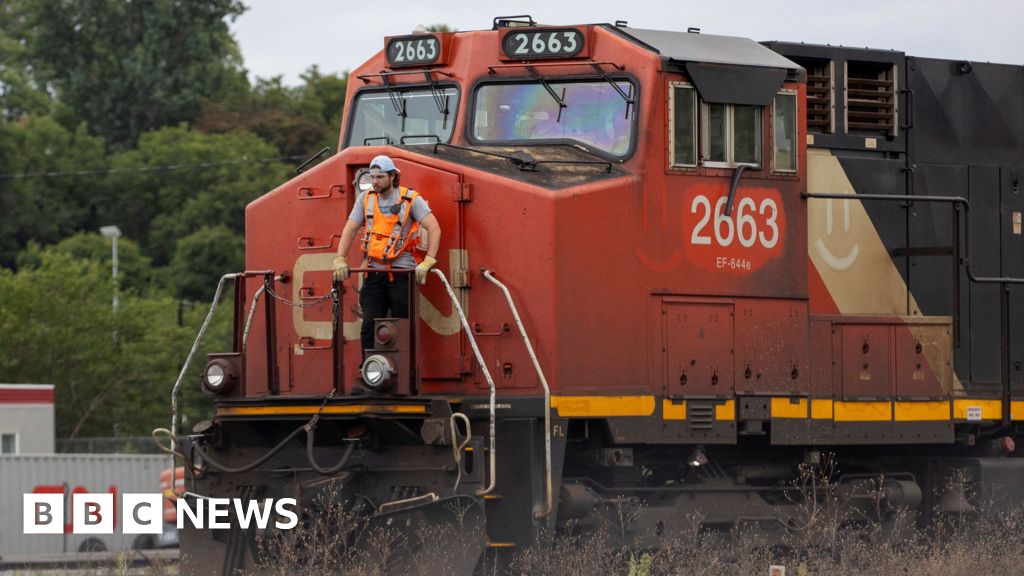Crucial supply chains are under threat across North America after a rail labour dispute in Canada led to shutdown of freight traffic on the country’s two largest railways.
Canadian National Railway (CN) and Canadian Pacific Kansas City (CPKC), locked out nearly 9,300 workers after midnight on Thursday (04:00 GMT), after failing to clinch a late deal with the Teamsters union.
Hours after the strike began, Prime Minister Justin Trudeau said the federal government would soon announce steps to resolve the work stoppage.
“We are not taking this lightly,” he told reporters in Sherbrooke, Quebec. “We are on this.”
Mr Trudeau offered no further insight into the government’s plan to resolve the shutdown.
Canada sends around 75% of all the goods it exports to the US, mostly over rail. A prolonged dispute could disrupt shipments of a wide range of goods, from grains and beans to potash, coal and timber.
The lockout will also snarl commutes for tens of thousands of people in Toronto, Montreal and Vancouver, where lines rely on CPKC-owned tracks.
Canada, the world’s second-largest country by area, relies heavily on rail transport.
After months of talks, the increasingly bitter negotiations ground to a halt late on Wednesday evening, CBC reported, with both sides accusing the other of refusing to negotiate seriously.
In separate statements, CN and CPKC said they took the steps after months after “good faith” negotiations, which stalled over working conditions like shift scheduling and fatigue provisions.
“Without an agreement or binding arbitration, CN had no choice but to finalize a safe and orderly shutdown and proceed with a lockout,” CN said in a statement.
“CPKC is acting to protect Canada’s supply chains, and all stakeholders, from further uncertainty and the more widespread disruption,” CPKC said, adding that binding arbitration was the only “responsible” way to move forward.
Speaking to the BBC on Thursday, the National President of Teamsters Canada, François Laporte, said he wanted to resume negotiations “as soon as possible”.
Mr Laporte said the sticking point for his union was safety.
“Across Canada, we have trains who are carrying goods, they are carrying energy, they are carrying chemicals,” he said. “And we want to make sure that those train are operated by people who get the proper rest, who are safe, get who are not fatigued.”
Mr Laporte echoed an earlier statement from the Teamsters Canada Rail Conference which accused the railways of caring only about the “bottom line.”
Dozens of industry and trade organisations warned last week in an open letter that the disruption would have “an immediate impact” from coast-to-coast and damage Canada’s reputation as a trading partner.
“Factoring in the millions of Canadian jobs that would be impacted, the magnitude of the disruption is daunting,” it said.
The US and Canadian chambers of commerce followed up earlier this week, warning of the potential “devastating” impact of the stoppage on Canadian businesses and families, but also the US economy.
A group of agriculture trade associations has urged Ottawa to step in, but the government has so far resisted calls for binding arbitration.
Labour agreements for both railways expired at the end of last year.
During the lockout, rail networks in the US and Mexico will continue to operate. But a stoppage north of the border could be felt across North America.
The White House has been in touch with Canadian counterparts and is encouraging all parties to remain at the bargaining table.
Some C$380bn (£214bn) in goods is moved by rail each year and railways move half of the country’s goods for export, according to the Railway Association of Canada.
Ahead of the full shutdown, both CPKC and CN had already begun pausing some shipments.
Shipping firm Maersk on Monday stopped accepting shipments destined for Canada meant to move by rail and that could not be transported on heavy trucks instead.
Professor Barry Prentice, director at the University of Manitoba Transport Institute, said the government would likely pass back-to-work legislation in the coming days if the sides couldn’t come to an agreement, as has been done in similar past disputes.
“This isn’t the best way to run the show,” he told the BBC on Wednesday.
“But it seems to be the playbook and and we’re back on this merry-go-round again.”
With additional reporting from Michelle Fleury

